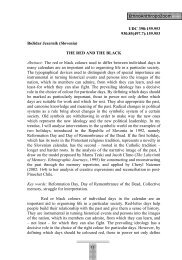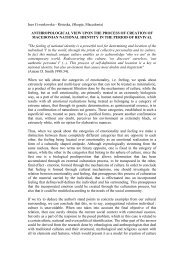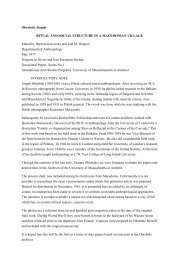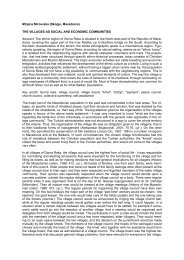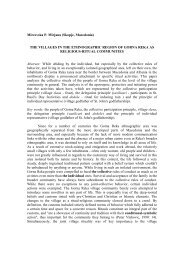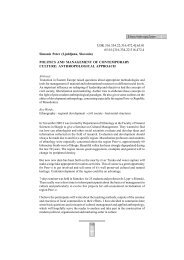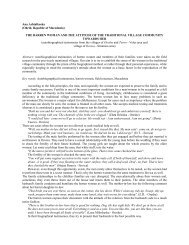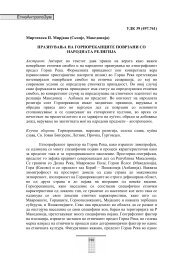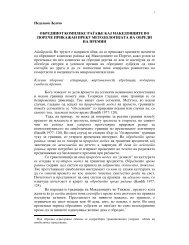Halpern M. Joel, Kerewsky-Halpern Barbara (USA)
Halpern M. Joel, Kerewsky-Halpern Barbara (USA)
Halpern M. Joel, Kerewsky-Halpern Barbara (USA)
Create successful ePaper yourself
Turn your PDF publications into a flip-book with our unique Google optimized e-Paper software.
12345<br />
12345<br />
12345<br />
12345<br />
12345<br />
12345<br />
12345<br />
12345<br />
12345<br />
12345<br />
12345678901234567890123456789012123<br />
12345678901234567890123456789012123<br />
EthnoAnthropoZoom<br />
12345678901234567890123456789012123<br />
12345678901234567890123456789012123<br />
12345678901234567890123456789012123<br />
costumes became more elaborate and were increasingly embellished with gold and<br />
silver. They used the traditional 100 silver filigree buttons, along with imported silk<br />
from Czechoslovakia. This resulted in a lavish wool fabric incorporating fringe and<br />
trims. Every year, on July 12, the unmarried men came home, chose a wife, and the<br />
village had a huge community wedding, lasting for days. A man from Gali~nik<br />
traditionally always marries a local girl. Then he goes away to work and comes back<br />
when he can. This joint wedding still exists today, and we would have gone with our<br />
waiter friend if we hadn’t made the Paris arrangements. This waiter married and went to<br />
Cairo, where his father had been a waiter. There he learned to speak eight languages<br />
including English, French, Egyptian (Arabic), along with his native Macedonian and<br />
probably Serbian as well and possibly Greek).<br />
Now he is the head waiter at this hotel in Skopje. He said that he is proud to be from<br />
Gali~nik and proud to be a peasant. However, he also took pride in the fact that he had<br />
never hoed or plowed in his life. (This attitude reflected his simultaneously enduring<br />
ties to his community of origin and his achievement of status outside this same<br />
community which enabled him to disdain the manual field labor integral to the<br />
maintenance of a peasant society. As his example illustrated the inherent contradiction<br />
in these value system ultimately led to his leaving the village permanently and today<br />
Galicnik in its geographically marginal location has become an artifact of the past.)<br />
He said that when the pe~albari came back for a visit, they would always return in their<br />
fine new city clothes. He recalled a time when he brought a car and drove home to his<br />
village.(in the 1970s I (JMH) visited the mountain village that Jozef Obrebski had<br />
studied in the 1930s (Vol~e in the region of Pore~e) and remember seeing a new Mercedes<br />
up on blocks outside an old fashioned village home. The car had obviously been<br />
driven with great care to this village as we were only able to reach in by jeep over bad<br />
roads.) But the next day he and all his friends, who had been away, would put on their<br />
peasant costumes that they loved.<br />
I was at his house yesterday and as he was talking about all this his wife casually<br />
slipped on the vest of the women’s outfit and lovingly caressed it. He said that he is 40<br />
and has been away (from Gali~nik) for a total 20 years and that they now have five<br />
children. Since he has a good position here in Skopje, he decided to remain here in<br />
Macedonia. He felt that he had been away from his family long enough. When he left<br />
home for the first time his two older children were babies. He returned and they were<br />
then 11 and 12 years old and didn’t know their own father. This idea of the husband<br />
leaving his wife and children for such a long time puzzled me. When I asked him about<br />
it and how they could he be separated for so long and still remain a family unit he<br />
replied that he couldn’t explain it.(Such attitudes don’t have simple explanations but<br />
in retrospect it is apparent that the strong attachment to the village meant more than an<br />
abstract idea of a community, a heritage and the overt manifestation in the clothes of<br />
the women and the cars and remittances of the men. Even in the new houses which<br />
were constructed. The major factor was, of course, the family and extended kin support<br />
network most particularly the unquestioning support of the women — wives and<br />
mothers.) At any rate, they are all together now living in Skopje, but when they say<br />
177<br />
12345<br />
12345



